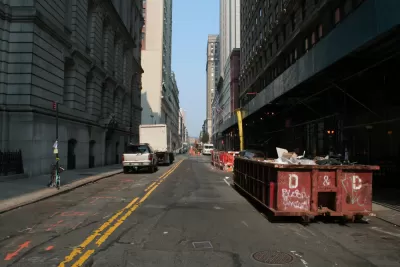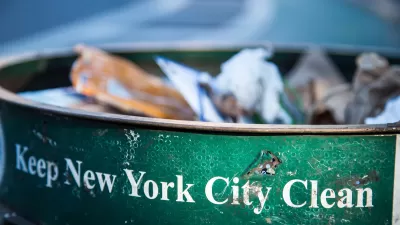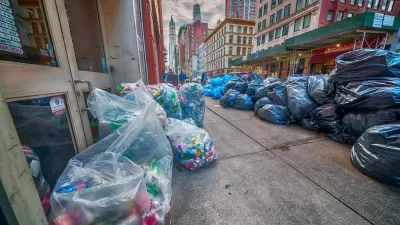A new law will reorganize the city’s trash collection network and reduce the number of sanitation trucks crisscrossing the city.

The New York City Council recently passed a bill to create waste collection zones throughout the city. "The bill, which represents years of activism, study and wrangling, aims to create a safer, more labor-friendly and environmentally sustainable industry, in which trucks travel shorter routes and recycling rates improve under a franchised system overseen by the Department of Sanitation," writes Matthew Flamm.
The new law will create 20 zones across the city’s five boroughs with each zone serviced by three carters. Advocates say that the new system will cut down on greenhouse gas emissions and also make streets safer for pedestrians, cyclists, and workers. Labor unions were split in their support, and other opponents argued that the bill would increase service costs for small businesses and put smaller waste operators out of business.
"[Department of Sanitation Commissioner Kathryn Garcia] led the development of the plan over the past three years, following a de Blasio administration report in 2016 that determined the introduction of waste collection zones could reduce truck traffic by 49% to 68%," notes Flamm.
FULL STORY: City Council passes historic waste zone bill

Alabama: Trump Terminates Settlements for Black Communities Harmed By Raw Sewage
Trump deemed the landmark civil rights agreement “illegal DEI and environmental justice policy.”

Planetizen Federal Action Tracker
A weekly monitor of how Trump’s orders and actions are impacting planners and planning in America.

The 120 Year Old Tiny Home Villages That Sheltered San Francisco’s Earthquake Refugees
More than a century ago, San Francisco mobilized to house thousands of residents displaced by the 1906 earthquake. Could their strategy offer a model for the present?

In Both Crashes and Crime, Public Transportation is Far Safer than Driving
Contrary to popular assumptions, public transportation has far lower crash and crime rates than automobile travel. For safer communities, improve and encourage transit travel.

Report: Zoning Reforms Should Complement Nashville’s Ambitious Transit Plan
Without reform, restrictive zoning codes will limit the impact of the city’s planned transit expansion and could exclude some of the residents who depend on transit the most.

Judge Orders Release of Frozen IRA, IIJA Funding
The decision is a victory for environmental groups who charged that freezing funds for critical infrastructure and disaster response programs caused “real and irreparable harm” to communities.
Urban Design for Planners 1: Software Tools
This six-course series explores essential urban design concepts using open source software and equips planners with the tools they need to participate fully in the urban design process.
Planning for Universal Design
Learn the tools for implementing Universal Design in planning regulations.
Clanton & Associates, Inc.
Jessamine County Fiscal Court
Institute for Housing and Urban Development Studies (IHS)
City of Grandview
Harvard GSD Executive Education
Toledo-Lucas County Plan Commissions
Salt Lake City
NYU Wagner Graduate School of Public Service





























